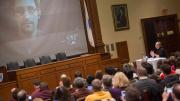At Harvard Law School’s Ames Courtroom on Monday, October 20, Furman professor of law and leadership Lawrence Lessig interviewed Edward Snowden in Russia via video conference. Using a question-and-answer format, the professor raised issues of institutional corruption and the role of whistle-blowers with the former National Security Agency (NSA) contractor who revealed last year that the agency routinely conducts mass surveillance of American citizens. Snowden now lives in Russia as he seeks asylum in the European Union.
Lessig, who directs the Edmond J. Safra Center for Ethics at Harvard and is also the founder of Rootstrikers, an organization dedicated to fighting government corruption, opened by asking Snowden about his ideological background. “I come from a government family,” Snowden replied, noting that his father and grandfather both served in the military, that his mother and sister still work for the government, and that he signed up as a Central Intelligence Agency (CIA) staff officer for the invasion of Iraq because he believed that the U.S. government does “good things for the right reasons.” Though he still believes that most people working for the government are good people doing good things for the right reasons, “there is a culture that pervades the senior officials, the political appointees,” he said, that has made them “less accountable to the public that they serve.”
Snowden argued that although not every government decision or program should be subject to public scrutiny, citizens ought to have an “understanding of the policies and the powers, broadly, that the government…is using in our name and using against us.” As a computer-system administrator, he had privileged access—“better than top-secret”—to classified NSA activities; he said that people have a right to know that government intelligence agencies are “creating programs behind closed doors and without oversight that are changing the boundaries of the rights that we enjoy as free people in a free society.” Because the NSA can track everyone, he offered as one example, “We have lost in many ways the freedom to associate.”
Lessig asked him to describe how he reached the decision to expose the government’s surveillance programs. It came not as the result of a single program, Snowden replied, but because “broadly, I was witness to mass violations of the Constitution, that…were happening in secret and…happening as the result of a broad breakdown throughout the branches of government.”
He went on to explain that he had engaged in civil disobedience because he believes that the democratic system of government is not able to work when people don’t know what their government is doing. “The public has lost its seat at the table,” he said, and in a democracy, “government legitimacy stems from the consent of the people.” He also pointed out that these issues reach beyond the United States, because “the technology [for mass surveillance] is here.” Snowden said he made the disclosures when he decided that the government had no way to “right itself,” and that he asked the journalists to whom he gave data to ensure, as much as possible, that no harm would come to any individuals and that the exposure of any particular NSA program had to be “in the public interest.”
Some citizens might like the fact that the government can use its surveillance powers to catch wrongdoers, Lessig pointed out. What if the data the NSA collects were encrypted and protected, and made available only by court order, he asked. Snowden noted that the Fourth Amendment to the Constitution prohibits not only unlawful search, but seizure. Lessig pressed further, asking him to consider the question, “putting aside the Fourth Amendment.” Snowden replied that he thought that even Lessig’s hypothetical procedure would violate “our natural [human] rights.”
Lessig’s penultimate question involved the ethics of whistle-blowing. After noting that there is “no public accountability process” for government whistle-blowers—a protection that Berkman professor of entrepreneurial legal studies Yochai Benkler has called for, and Lessig supports—he asked whether Snowden would ever submit himself to the judgment of the law. Snowden, noting that negotiations with the U.S. government are continuing, declined to discuss the particulars of his case. He did say that “making a public-interest argument” is “banned” as a defense, and argued that the existing U.S. Espionage Act is being misused in cases like his own, especially when it is used to threaten journalists with “10 or more years in prison.”
The questions asked during the interview had been submitted in advance by members of the audience. To close, Lessig chose a sartorial query: “Hoodies or suits?” Snowden laughed, and said that he wore suits only on the advice of his attorneys. “I am a hoodie guy,” he said. “I hope by the time I die and the next generation has inherited the earth, we don’t even have suits anymore.”
For more about Lessig, who is also interested in constitutional reform to change the way elections are funded, see “A Radical Fix For the Republic,” the cover story of this magazine's July-August 2012 issue.









